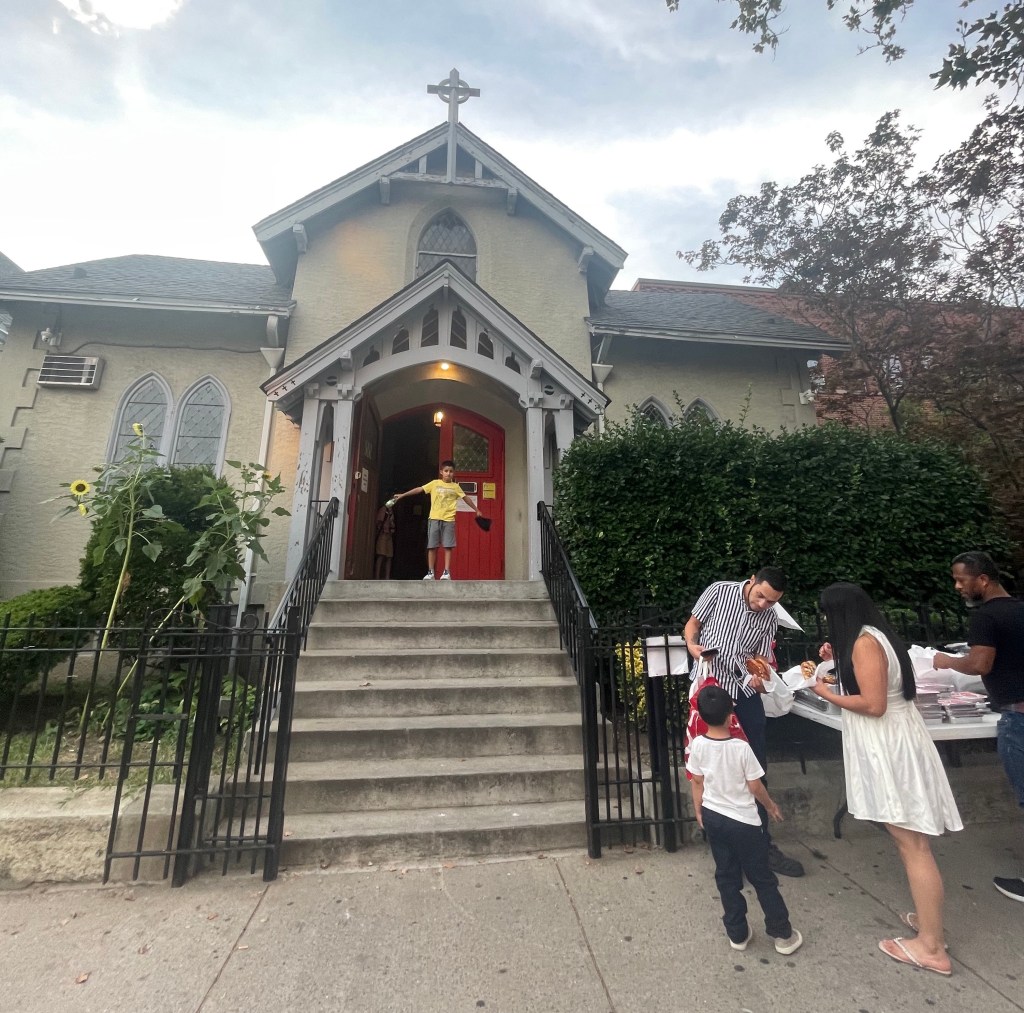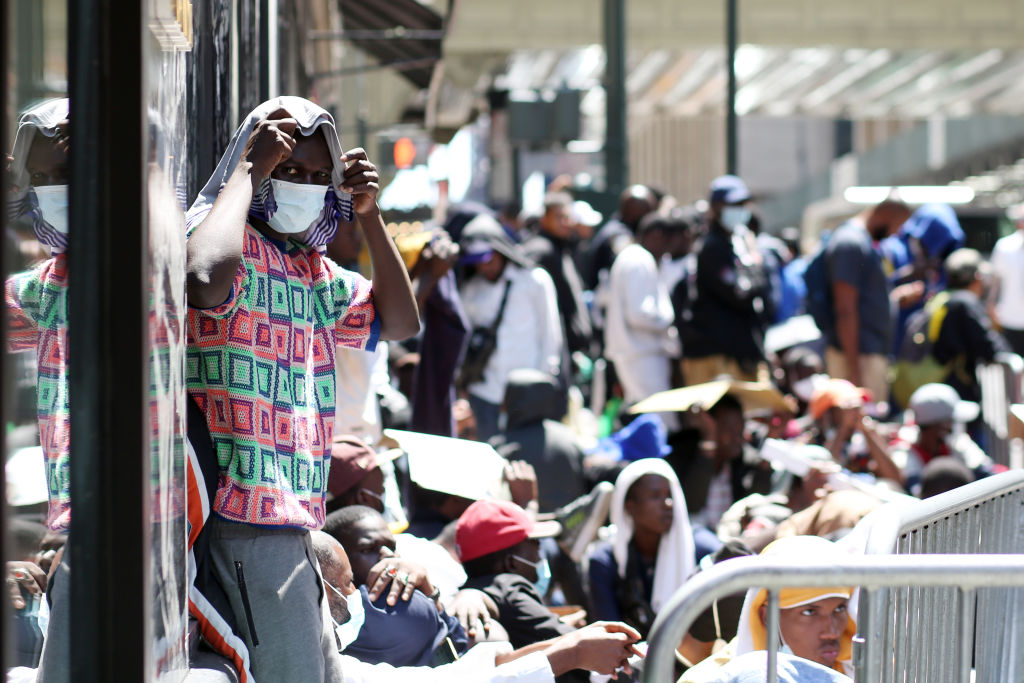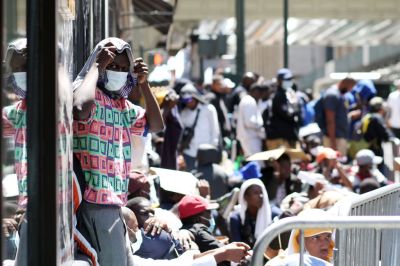NEW YORK—Technically, Good Shepherd Lutheran Church in Bay Ridge, Brooklyn, was closed for renovations.
Yet the doors were open to migrants and asylum seekers—new arrivals as well as those who had been in the city a while—who found themselves in immigration limbo. Rev. Juan Carlos Ruiz scarcely had a moment to sit on Tuesday when his phone rang. “Another food delivery,” he said, one of several such instances. A man on a motorbike dropped off food donations from Tacombi, a Mexican restaurant.
Another man ambled by as Ruiz handled the delivery and asked if the church was open.
“No,” Ruiz said. A pause. “You want food?”
It’s become a typical experience as of late. What began as a political statement by Texas Gov. Greg Abbott (and other GOP governors), offering migrants free rides out of state, has morphed into a full-blown crisis. New York City’s resources have struggled to meet the needs of more than 100,000 new arrivals since August 2022. The city’s shelter system has been buckling under the strain after Republican governors began sending busloads of migrants to nearby Democratic-run sanctuary cities like Boston, Chicago, Denver, New York City, and Washington. And the rhetoric has started to boil over: “This issue will destroy New York City,” Mayor Eric Adams said Thursday. “The city we know, we’re about to lose.”
Amid the finger-pointing, heated rhetoric, and a backlogged immigration system, migrants and asylum-seekers remain in limbo. The facilities city officials have opened to deal with the wave of migrants have at times filled up. Last week, the block outside of Roosevelt Hotel in midtown Manhattan—one of the city’s designated migrant intake centers—was basically clear. Migrants, wearing identification cards on lanyards around their necks and green bands on their wrists, came and left. But a few weeks before in late July, migrants spent a week straight sleeping on the streets outside the Roosevelt. The city coped by opening more temporary shelters in hotels (it’s opened over 200 emergency shelter sites), tents on Randall’s Island, an airfield, and office buildings.
As the city facilities founder, nonprofit and faith groups such as Good Shepherd have mobilized. “Per day, it was about 150 people coming through,” Ruiz said as he named the needs they had. “Food, clothing, transportation, communication.” But the church also provided metro cards to navigate the city and legal assistance to navigate the byzantine and backlogged immigration system. The church hosts a weekly legal clinic, staffed by around 30 volunteers, to help people put together their asylum applications.
The church also allowed families to sleep in the church itself for a time, at one point hosting families around the clock, with men sleeping in the sanctuary and the women and children in another part of the church. As shelters filled up, news about Good Shepherd spread: “People who have been here telling them, if you need to be helped … go to Good Shepherd.”
And they have.

In the church’s sanctuary, music minister Mark Lambert played the organ on Tuesday in preparation for the next service on Sunday. Laura, a 25-year-old Colombian migrant, changed the diaper of her 2-month-old daughter in an adjacent room. Her husband, Julio, filled out asylum applications. Their 9-year-old daughter fanned her baby sister. Fleeing gang violence at home, they came to New York to meet with friends. But when they arrived over a year ago, those friends “didn’t receive our calls or messages again.”
Nearby in Ruiz’s study, 39-year-old Fernando Cubides sorted through thick stacks of paper arranged in neat piles on the floor. He was prepping his asylum case for a court date the next day. His sons, ages 10 and 8, leaned close together on a pew to watch soccer on a phone screen. Cubides also fled Colombia after a paramilitary group tried to recruit him. He knew once he refused they would kill him and his family in retaliation. He described disturbing instances of violence the gangs had taken in the past to establish power: dismemberments, killing children, and torture.
“Here, you are free to express yourself,” said Cubides, who worked as a journalist and a chef. “You don’t fear retaliation.”
A few minutes later, the room shifted from a makeshift law study to an improvised wedding chapel. Another migrant couple, with their 4-year-old son clinging to his dad’s hand, took their vows as Ruiz officiated. Fifteen minutes later, with a marriage license in hand, they were on their way.
Near the study door hung a stone gray sign: “BIDDEN OR NOT BIDDEN, GOD IS HERE.”
The same can be said for the migrants—and that fact is driving a wedge between city, state, and federal officials.
Adams and New York Gov. Kathy Hochul—both Democrats—are locked in a legal battle over the state’s Right to Shelter law. In 1979’s Callahan v. Carey, the New York Supreme Court ruled a provision of the state constitution holding that the “aid, care and support of the needy are public concerns and shall be provided by the state” obligated the city to provide shelter for anyone who requested it. Adams wants the right-to-shelter suspended if the city’s resources can’t meet the need. Hochul wants to make sure the remaining 57 counties in New York are not obligated to also provide shelter.
Even though they’re fighting each other over the shelter law, both Hochul and Adams are united in wanting the federal government to do more. So far, the Biden administration has reimbursed the city to the tune of $145 million to help cover costs such as housing, educating children, and feeding the new arrivals. But Adams said the cost to the city could exceed $12 billion by 2025. His administration has even distributed flyers at the U.S.-Mexico border with the message that there is “no guarantee” of finding shelter in the city, and urging people to “consider another city” when the state of Texas offers to bus them elsewhere.
At the end of August, Homeland Security Secretary Alejandro Mayorkas offered recommendations on how the city could step up its response and noted areas it had fallen short. The Biden administration also offered 11 federal sites in the state that migrants could be housed.
But part of the strain on the city could be alleviated if the current immigration system weren’t so dysfunctional. Adams has asked the Biden administration to expedite giving migrants work permits—which would allow them to earn money and support themselves financially—though others have argued that alone will be insufficient as long as housing supply remains limited and the shelter law remains in place, attracting people to New York. Mayorkas conceded that the work permit lag is an issue. The administration is considering making “operational efficiency” changes to quicken the process somewhat, but is limited by federal statutes.
Current federal law requires asylum applicants to wait six months before applying for work authorization. While a group of New York representatives has introduced federal legislation to cut the time required for work authorization, its fate in the current Congress is uncertain at best.
Charitable and faith-based organizations like Good Shepherd won’t be able to shoulder the magnitude forever, Manhattan Institute fellow John Ketcham tells The Dispatch. If the influx continues unabated and migrants decide waiting out the country’s backlogged immigration system isn’t worth it, the U.S. could have a new crisis on its hands. “As the situation worsens without much progress,” Ketcham says, “the asylum-seeker crisis may well morph into a crisis of the undocumented.”






Please note that we at The Dispatch hold ourselves, our work, and our commenters to a higher standard than other places on the internet. We welcome comments that foster genuine debate or discussion—including comments critical of us or our work—but responses that include ad hominem attacks on fellow Dispatch members or are intended to stoke fear and anger may be moderated.
With your membership, you only have the ability to comment on The Morning Dispatch articles. Consider upgrading to join the conversation everywhere.